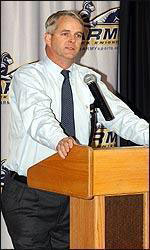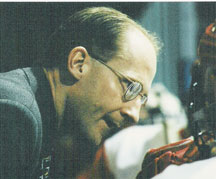|

Rob Riley (former West Point Coach)
I was fortunate to be a part of the Army-RMC rivalry
for nearly twenty years. For me, I grew up with
this rivalry, and understood the magnitude and
importance of the game. When the game was the final
one for both teams it had a great build up, but over
time with league and playoff implications, the
timing of the game changed. One thing that did not
change was the intense competitive spirit of both
teams. Similar to the Army-Air Force rivalry, our
players (Army-RMC) did have a lot in common as their
military training prepared them for a much bigger
cause than other college athletes experience. It is
unfortunate that this seems be changing.
My best memory is of our 9-7 win at Kingston in
1986. It was significant because we had not won
there since 1970, it was the first time we stayed in
a hotel as a team( and nearly had our team taken by
RMC personnel in a planed bomb scare that Friday
night), and most importantly it was my dad's 18th
and final visit to Kingston. My most disappointing
memory was the following year when RMC visited Tate
Rink for the first time and beat us.
The best played game was the 1996 game in Kingston
where we visited with one of Army's best teams. We
won 24 games that season and two freshmen, Dan
Hinote and Andy Lundbohm scored for us as goalie
Daryl Chamberlain had an incredible performance in a
2-0 game. Hinote was drafted by Colorado that year
and Lundbohm went on to become the only Army player
to score in four consecutive RMC games.
I enjoyed the visits to Kingston, especially the
Canadians love and passion for the sport of hockey.
Being able to see Danny McLeod after we became
great family friends was always a thrill. Getting
to know Bill Oliver after his AD days also became a
highlight of the rivalry. We were able to look
beyond the game and the challenges and develop a
great relationship. Those around me said I was
softening with all my new RMC friends!! I also
enjoyed getting to know Andy Scott during his years
as the RMC coach. We had a very respectful
relationship during those years. It did suffer when
I saw a picture of a linesman and referee (the next
day) who was a staff member of the athletic
department in their gym. So please, do not start
with officiating!!!
Once again, I feel lucky for those memories.
Rob Riley
|

14080 Andy Scott (RMC ’83) - former Redmen player &
former RMC Head Coach.
I
have been fortunate to take part in seven games in
the RMC-West Point hockey series; two as a player
and five as head coach. For me personally, there
were two important aspects to the series. Firstly,
when you took part in an RMC-West Point game you
were representing your country and for those sixty
minutes you wanted to do everything in your power to
win. Secondly, you realized at the end of it all
that the team you were competing against was made up
of players with whom you shared a common bond; you
were both officers in training for a career of
defending the common interests of both countries and
our allies.
Anybody who has played in the game has at least one
or two humorous stories connected with the rivalry.
One of my favourites centers around the
psychological warfare that our coach Wayne Kirk
tried to wage with our opponents. In 1982 (both my
and Wayne's first game), he wanted to try and fuel
over-confidence in what was supposed to be a very
strong West Point team. He had sent several signals
via different sources to West Point that we did not
have a particularly strong team that year. He
capped off this strategy the day before the game at
our practice which was attended by the West Point
team. He had us dress in old jerseys and socks,
mixed up the lines, and threw a bunch of new and
complicated drills at us. The results were
predictable. West Point could be forgiven for being
a little over-confident! You could almost see our
opponents salivating with anticipation of the
massacre to come the next day. Whether this ploy
had anything to do with our 4-3 win, I don't know.
But, you can't argue with success.
The following year, Wayne took the opposite tack.
He tried to make us out to be stronger than we
probably were. His final touch that year was to
have several cases of champagne brought into the
rink in full sight of the West Point team. Again,
I'm not sure it had any effect on our opponents, but
the thought of free champagne certainly made an
impact on us. We skated away with a 3-2 victory; at
the time, the first at West Point since 1959.
By comparison, I enjoyed coaching in the series
(1997-2001) less than playing in it. There was a
lot of pressure (perceived or otherwise) to win,
compounded by the fact that we had not prevailed
since 1987. It was certainly considered the most
(only?) important game of the year by the College at
large. Additionally, there was the ever-present
institutional desire for us to "play nice". As a
coach, this kept you walking a razor thin line. I
think the lowest point of those five years came with
37 seconds left in the 1998 game when Greg Buckmeier
scored to turn our almost 2-1 win into a 2-2 loss
(or what felt like a loss). I felt poorly for our
players who had given everything they had that day
and had come so close to beating a very good West
Point team. The high point came two years later
when we finally ended the 12 year-old winless streak
with a 3-0 win in Kingston (and managed to "play
nice" at the same time!).
Coaching also allowed me to get to know Rob and
Brian Riley, the West Point coaches. It was great
to be able to talk to two people who experienced the
same unique rewards and problems inherent in
coaching cadets. I was also flattered at being
remembered by their legendary father who referred to
me in 1997 at our first meeting since the 1983 game
as "...that bastard who stole to games from us in
the early '80's". I viewed that as high praise from
a giant of USA hockey.
It is my sincere hope that many more classes of
hockey-playing cadets at each institution will enjoy
the unique and rewarding experience of playing in
the RMC-West Point series.
14080 Andy Scott (RMC ’83)
Editor’s Note: Andy Scott is currently the
General Manager and Head Coach of the Central Penn
Panthers Junior Hockey Club in Lancaster, PA. He is
also the Central Penn Panthers Youth Hockey Director
and a vice-president of USA Hockey's Atlantic
District. |